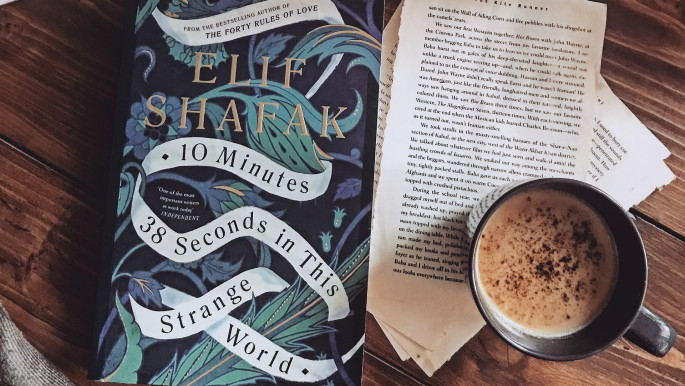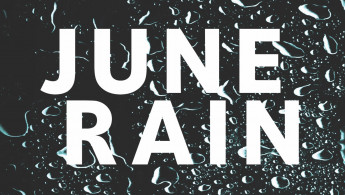June Rain: A powerful portrait of identity and division in Lebanon
The gripping introduction to June Rain, penned by author Jabbour Douaihy, reveals nothing of the novel, which follows several futile trajectories of memory to no resolution.
On 16 June, 1957, a village church in Barqa, North Lebanon becomes the site of a shootout. School children are sent home early, amid a foreboding atmosphere in which their guardians refuse to divulge the reason.
The massacre alters community relations in the village, and its residents are plunged into a tense atmosphere of divisions, vengeance and the ever-present dilemma of where loyalties lie.
For the protagonist, Eliyya, whose father Yusuf is one of the victims, the story takes on a different dimension. Sent abroad by his mother Kamileh as a precaution for his safety, Eliyya returns from the US to the village decades later to learn about his father and the massacre which ended his life.
A stranger among the villagers, Eliyya's identity is perpetually contrasted against the familiarity of the villagers.
Eliyya's return to Barqa is characterised by absence. His father was killed before he was born, thus Eliyya's quest to discover who his father was through other people's narratives becomes a colossal task, and one that is marked by the massacre. Truth is elusive, however. Indeed, as elusive as identity is to Eliyya.
 |
|
| Read more from The New Arab's Book Club: Elif Shafak's 10 Minutes 13 Seconds In This Strange World |
"There are some stories you listen to and you can tell they're missing something and that whoever is telling them knows more than he is letting on." This is one observation made by the narrator as Eliyya proceeds on his quest, which is verified by a shopkeeper who Eliyya approaches for information about his father. "At any rate, don't believe everything you hear."
With this admission, the novel takes on a different dimension. Already, the distance between Eliyya and the village where he was born lingers in the reader's mind, reflected also in the way the villagers construct their own identity of the protagonist who returned and who will, eventually, leave again.
Now, however, there is an admission of mistrust and vagueness which reflects back on Eliyya's identity. The story of the massacre and the protagonist share similar defining traits. Chaotic and silent, knowledgeable and reticent, both strands of Douaihy's narrative run parallel to each other, creating a gap which is both frustrating and expected.
For Eliyya, his return to Barqa, in particular within the context of what he set out to achieve, becomes an endless trail of unknowns. Each fragment of the story regarding his father does not complete the whole picture; he is, after all, admonished not to believe anything anyone says.
The massacre, its perpetrators and victims, on the other hand, are both exploited and protected by the people left behind. Only strands of the story are revealed, mostly as part of another person's recollection, or as an integral part of the history which now shapes the village and its altered relations.
 |
The massacre alters community relations in the village, and its residents are plunged into a tense atmosphere of divisions, vengeance and the ever-present dilemma of where loyalties lie |  |
From his interviews with several people in the village, Eliyya compiles notes which he leaves behind when he returns to New York. Instead of piecing a story together, Eliyya is left with several narratives that fail to give him a clear of the most pressing question - who killed his father.
The constant warnings to mistrust any given narrative, even from witnesses, points towards an inconclusive journey - one that starts with distance and ends with distance. Eliyya eventually leaves Barqa behind to return to his life in the US, and the identities he conjures while refuting his own.
Another contrast evoked by the author is the focus on the intricacies of life in Barqa, which in a way makes up for the missing details of the massacre. Through Eliyya's quest, some villagers' narratives are revealed, shedding light upon the social dynamics before and after the shootout, yet it is never enough to provide a revelation when it comes to the perpetrators' identities.
 |
|
| Read more The New Arab's Book Club: A dystopian vision of Kuwait: Mama Hissa's Mice |
Again, the author's focus on identity, or the absence of it, is what shapes the novel and which points back to Eliyya. Eliyya arrives in Barqa as a stranger and departs further dissociated from his roots, determined to sever the remaining ties.
This may be partly as a result of the futile search for his roots and his father's demise. However, Eliyya's dissociation started in the village before he was sent away by his mother as a means to protect him.
The ensuing complexity which Eliyya indulges in is also a reflection of what he discovered in Barqa - that no narrative can be fully trusted.
Or rather, in Douaihy's masterpiece, which plays upon inconclusive characters and events, there is a permanent presence of an unreliable narrator that seeks to withhold information as he pleases.
Ramona Wadi is an independent researcher, freelance journalist, book reviewer and blogger specialising in the struggle for memory in Chile and Palestine, colonial violence and the manipulation of international law.
Follow her on Twitter: @walzerscent
The New Arab Book Club: Click on our Special Contents tab to read more book reviews and interviews with authors:
 |
|


![President Pezeshkian has denounced Israel's attacks on Lebanon [Getty]](/sites/default/files/styles/image_684x385/public/2173482924.jpeg?h=a5f2f23a&itok=q3evVtko)



 Follow the Middle East's top stories in English at The New Arab on Google News
Follow the Middle East's top stories in English at The New Arab on Google News


